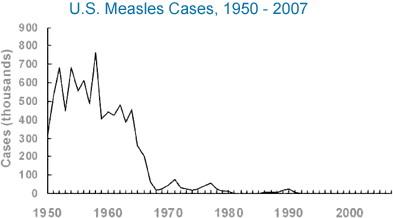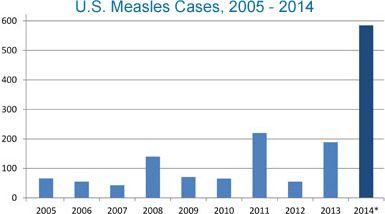
Childhood immunizations have dramatically improved the health and survival of children in Mississippi ever since polio vaccinations began in 1955. Today, diseases like diphtheria, polio, rubella and pertussis that once killed or disabled Mississippi children are now almost completely eliminated, thanks to widespread childhood immunization.
A History of Protection
- Mississippi has one of the most successful childhood immunization programs in the nation, and as a result one of the lowest rates of childhood diseases.
- Other states are following Mississippi's lead and tightening their immunization requirements to reduce disease outbreaks.
- Childhood immunizations have a strong safety record, with far fewer side effects than the diseases they prevent.
- Immunization is a group effort that benefits the whole community. When your child is immunized, it protects the children around them, and when adults and children in the community are fully immunized, it keeps your child is safer from disease.
Why Immunize?
Immunizations save lives
Immunizations have protected Mississippi's children from deadly diseases for over 50 years. Highly contagious diseases like measles, mumps, polio and chicken pox used to be unavoidable childhood illnesses that took children out of school and put them at risk of hospitalization or death. As late as 1998 Mississippi lost four children to chicken pox alone, deaths that immunizations could have helped prevent.
Mississippi began a strong program of childhood immunization in 1994 to bring the state up to national standards for immunization protection. Since then, our state has been a national leader in immunization coverage, with over 99% of children who enter kindergarten being protected. Mississippi children now have an excellent chance of growing up without the damage that childhood diseases can cause, and are less likely to die from them than ever before.
Immunizations work

Most childhood vaccinations produce immunity in more than 90% of children. This highly effective protection is responsible for a dramatic drop in cases of disease in Mississippi and the United States. With the decline in cases come equally dramatic declines in hospitalizations, complications and deaths.
Immunizations prevent outbreaks

Childhood diseases are still a threat today. Some states where fewer children are immunized – because of relaxed requirements or parental choice – are now seeing outbreaks of childhood diseases that were once almost unknown. Nearly 600 cases of measles were reported in the U.S. in 2014, the majority of which were in children who were not immunized. That's a tremendous increase from 2004 when there were just 37 cases nationwide. In spite of this increase, there have been no measles cases in Mississippi in the last ten years.
Childhood diseases are still a threat
Serious childhood diseases are prevalent worldwide, and children are more exposed than ever before to diseases acquired from travelers. These major diseases can cause illness, deformity, permanent damage or death.
Polio infects the spinal cord and permanently destroys nerves that control the arms and legs.
Mumps is a painful infection of the salivary glands which can cause permanent hearing loss in some children.
Chickenpox
This highly infectious disease causes serious illness and death in very young children.
Highly contagious, measles can lead to deafness, brain damage, and death.
Immunizations Are Your Best Protection
Immunizations provide a high level of protection for your child at a very low risk. However, mild reactions such as temporary discomfort or low fever are possible. Serious or dangerous reactions are very rare: about 1 in one million vaccinations or fewer. The risk of serious illness from immunizations is far lower than the risk of illness from the diseases they prevent.
Some children who have been diagnosed with deficient immune systems or who have certain unusual health conditions should not be immunized on the same schedule as most children. For these rare cases, exemption from immunizations is important for their overall health. These children rely on those around them to be immunized in order to stay safe from disease.
There is no evidence for lasting adverse effects from immunization
The possibility that immunizations could cause lasting health problems has been extensively studied to ensure that children are safe. The Centers for Disease Control and Prevention, the National Academies of Science and others have both made careful evaluations of evidence over the years. No supporting evidence has yet been found to link immunizations with health conditions or disorders in later life, including asthma, autism and diabetes.
Multiple immunizations are safe
Immunizations rely on the natural action of the body's immune system to create protection against disease. The immune system is constantly active against the bacteria that we constantly meet every day in food, water, air and the surfaces we touch. Giving one, two, or three immunizations in a single dose doesn't add any significant burden to the body's immune system. Careful studies have shown that there is no difference in the way children tolerate a single immunization compared to multiple ones.
Delaying immunization doesn't help your child
Being immunized later than scheduled exposes your child to the risk of infectious disease for a longer time, at an age when they are very susceptible to illness. Immunizations should be made according to schedule to get the best protection for your child as soon as possible.

Required Immunizations Protect Your Child
In Mississippi, we require all children to be fully immunized before entering school. This requirement has done an excellent job of protecting Mississippi's children, and given them a lifelong advantage against disease. Few other states offer this high standard of protection for their children. We think your child has a right to the best protection possible.
School Entry Requirements
State law requires these five vaccines against nine diseases to qualify for school entry:
- Diphtheria, Tetanus and Pertussis (DTaP) (5 doses)
- Polio (4 doses)
- Hepatitis B (3 doses)
- Measles, Mumps, Rubella (MMR) (2 doses)
- Varicella (Chickenpox) (2 doses)
Your child is safer when all children are immunized
Successful immunization is a community effort. When your child is surrounded by others who have been immunized, his or her risk of exposure is greatly reduced. That creates critical protection for infants under six months of age, who are too young to be immunized. But when other children skip or delay immunization, they become possible sources of infection for your child – and childhood diseases are usually very infectious. Keeping this protective circle strong for children of all ages is why exemptions from immunization are granted only when there is a clear medical need. This keeps children as safe as possible while ensuring that those with exceptional medical conditions can live, play and learn with others.
Exemptions from immunizations
In rare cases, certain children have medical conditions that require an immunization schedule that omits or delays vaccinations required for school attendance. You can qualify for exemption with a letter from your child's pediatrician, physician or internist. Exemption puts these children at higher risk for childhood diseases, so it's important for those around them – children and adults – to be fully immunized.

